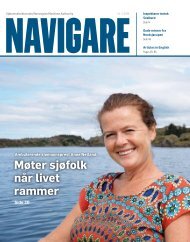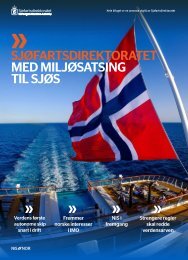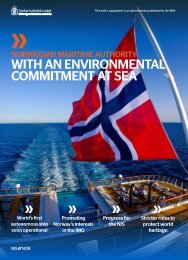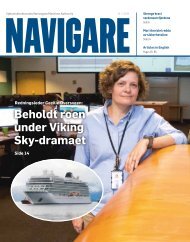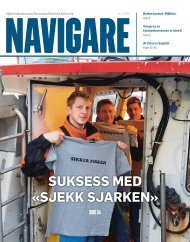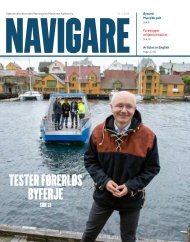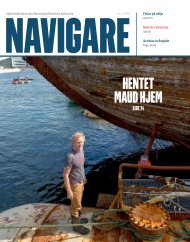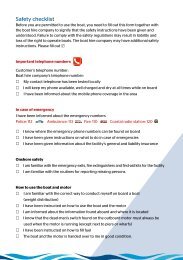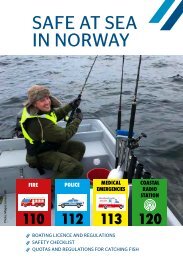Navigare 2- 2017
Create successful ePaper yourself
Turn your PDF publications into a flip-book with our unique Google optimized e-Paper software.
NEWS<br />
Stricter curbs on contaminants:<br />
Aiming to save 200 000 lives<br />
in five years<br />
Big cuts in the sulphur content of marine fuel oil recently adopted by the<br />
International Maritime Organisation (IMO) are set to have a significant impact on<br />
deaths from air pollution.<br />
The revised requirements mean it<br />
will be forbidden from 2020 to<br />
use fuels containing more than<br />
0.5 per cent of sulphur, compared<br />
with the present ceiling of 3.5 per<br />
cent.<br />
“This is one of the largest<br />
curbs on polluting emissions in<br />
history,” says Sigurd Enge, who<br />
runs shipping and Arctic work at<br />
Norway’s Bellona environmental<br />
foundation. “It’s really big.”<br />
International maritime<br />
tran sport is by far the biggest<br />
source of sulphur oxide (SOx)<br />
emissions, with the sulphur<br />
content of heavy fuel oil (HFO)<br />
up to 3 500 times above European<br />
limits on diesel oil for cars.<br />
These heavily polluting substances<br />
cause acid precipitation,<br />
KJELL JØRGEN HOLBYE, MARKEDSMEDIA<br />
but the biggest impact of the<br />
tighter rules will be felt in densely<br />
populated areas affected by heavy<br />
vessel traffic.<br />
That includes such countries<br />
as Egypt, Japan, Singapore, the<br />
Philippines and China, where<br />
reducing the SOx content in the<br />
air will literally extend the lives of<br />
many people.<br />
Measures<br />
“An unpublished study by the<br />
IMO indicates that the measures<br />
being adopted from 2020 will<br />
save as many as 200 000 people<br />
from an unnecessarily early<br />
grave,” says Enge.<br />
“That relates only to potential<br />
victims of lung cancer and heart<br />
disease from such pollution – and<br />
UTSTYRET: Sjøfartsdirektoratets inspektører har utstyrt som effektivt<br />
måler svovelinnholdet i drivstoff. FOTO: SJØFARTSDIREKTORATET<br />
excludes loss of life because of<br />
asthma.”<br />
Sulphur in HFO is already<br />
strictly regulated in some sea<br />
areas – the Baltic, the North Sea<br />
south of the 62nd parallel and off<br />
the US west and east coasts.<br />
The NMA is responsible for<br />
seeing to it that shipping complies<br />
with the 0.1 per cent limit set for<br />
these sulphur emission control<br />
areas (Secas).<br />
Its inspectors have adopted<br />
new technology in the form of the<br />
Bruker S1 Titan and the Niton<br />
XL2 GOLDD portable measurement<br />
devices to catch environmental<br />
transgressors.<br />
They use X-rays to determine<br />
the sulphur content in HFO in<br />
30-60 seconds. Anyone caught<br />
out by the checks can expect juicy<br />
fines of NOK 100-200 000.<br />
“In our experience, about five<br />
per cent of the ships inspected are<br />
breaching the rules,” says principal<br />
engineer Svein Erik Enge in the<br />
NMA’s section for inspection and<br />
emergency preparedness. “We<br />
have an ambitious goal for increasing<br />
the number of checks.”<br />
Extended<br />
“Our target for the Secas is to get<br />
them extended so that the Norwegian<br />
Sea above the 62nd<br />
parallel is also included,” observes<br />
Sigurd Enge at Bellona.<br />
He makes it clear that the<br />
ENGLISH TRANSLATION FROM PAGE 30<br />
VIKTIG: Sigurd Enge i Bellona<br />
omtaler svovel reguleringene som<br />
svært viktige, spesielt for befolkningstette<br />
områder med stor skipstrafikk.<br />
<br />
FOTO: DANIEL SANNUM LAUTEN<br />
NMA and the Norwegian government<br />
on the whole have made a<br />
strong contribution to the process<br />
leading up to the new IMO rules.<br />
“This is a big victory for the<br />
regulation of international shipping,<br />
a sector which isn’t that easy to<br />
bring under proper control.<br />
“With the new regime,<br />
shipowners worldwide will have<br />
to convert to new fuels, such as<br />
liquefied natural gas and lowsulphur<br />
oil, at a cost of many<br />
billions of dollars.<br />
“It’s a great achievement that<br />
the negotiators have managed to<br />
break through such barriers and<br />
actually put the regulations in<br />
place.”<br />
The Bellona activist regards<br />
the NMA as a partner, and believes<br />
that Norway’s maritime sector<br />
is among the best in the world.<br />
“As a shipping nation, we<br />
benefit from strict environmental<br />
regulations quite simply because<br />
we have shipping companies and<br />
suppliers who position themselves<br />
in relation to these.<br />
“This type of maritime<br />
activity is the business we’re<br />
going to make our living from in<br />
the future, and the NMA plays a<br />
key role in that work.”<br />
<strong>Navigare</strong> 2 - <strong>2017</strong> | 63










